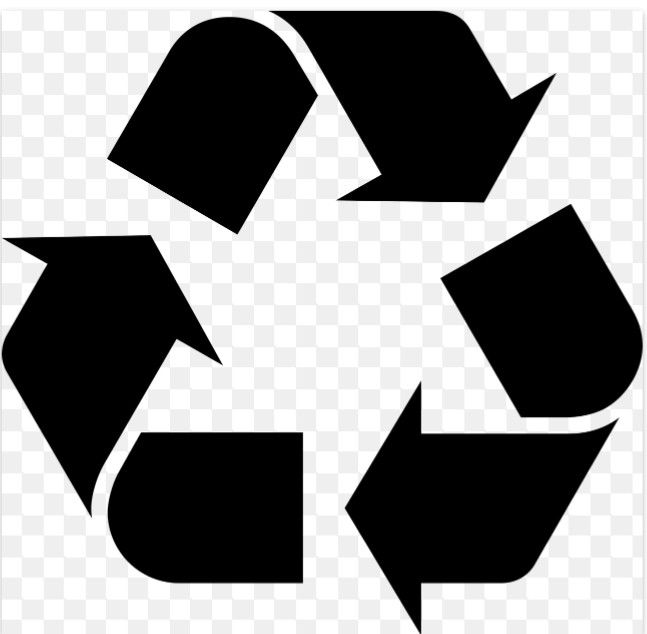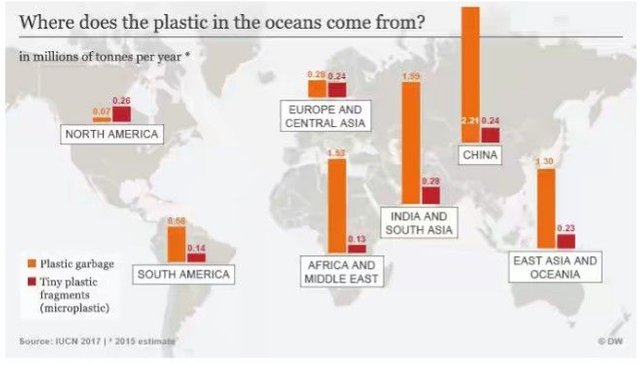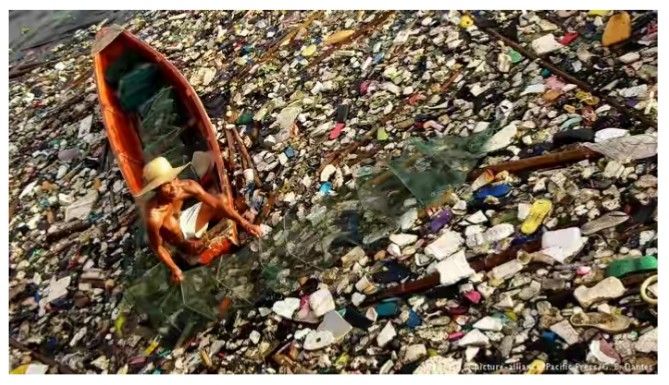Plastic recycling: one major step in saving the only planet man calls home.
Without any doubt, we are surrounded by plastic. Chairs, keyboards, tables, accessories, phones, almost everything is made of plastic, at least to a certain degree.
Plastic Recycling
This is defined as the process of collecting scrap or waste plastic and reprocessing the material into useful products. Recycling is a major part of the efforts, worldwide, to cut plastic in the waste stream, especially as a greater part of plastic is non-biodegradable. An item made out of plastic is recycled into a different product, which usually cannot be recycled again.

The global symbol for recycling/recyclable items
Image Source: pixabay
Now, to highlight the impact of plastics and plastic pollution on our environment, below are some facts.
- An estimated 8 million tonnes of waste plastic are dumped in the Earth's water bodies annually.
- In every 15 minutes, 500 billion plastic bags used worldwide, with about 160,000 plastic bags used globally every second!
- More than 50% of plastics are disposed off after single use.
- There are six times more plastic debris in the North Pacific Ocean than plankton, and the volume of plastic waste thrown away into water bodies every year could be responsible for the death of as many as 1 million sea creatures as a result of eating micro-plastics (plastic broken into small pieces over time).
- Plastics account for 10 percent of total global waste generation, with enough plastics thrown away to travel around the world four times generated annually.
- Plastics take 500 to 1000 years to degrade.
- Recycling plastic conserves about over 80% energy more than using new raw materials to produce new plastics.
- Recycling a single plastic bottle can provide enough power to light up a 100 watt bulb for roughly an hour.
- There will be more plastic in the ocean than fish by 2050, while researchers believe the amount of ocean plastic will be 10 times greater by 2020 (Ellen MacArthur Foundation).

Image Source: Google
As we can see from the above listed facts, there are repercussions for the continued mismanagement of plastics. No one could have summed it up better than the legendary Leo Tolstoy.
One of the first conditions of happiness is that the link between man and nature shall not be broken - Leo Tolstoy.

A landfill in Philippines
Image Source: Google
What Plastics Are Recyclable?
6 common types of recyclable plastics are listed below, typified by their common products.
Polystyrene (PS) - used in making foam hot drink cups and plastic cutlery.
Polypropylene (PP) - used in making ice cream containers, lunch boxes and take-out food containers
Low-density polyethylene (LDPE) - used in making garbage bins, as well as squeezable bottles.
Polyvinyl chloride (PVC) - used in making cordial, juice or squeeze bottles.
High-density polyethylene (HDPE) - used in making shampoo containers and bags for groceries, as well as cereal box liners.
Polyethylene terephthalate (PET) - used in making containers for peanut butter, jelly, jam, as well as pickles. It is also used in making oven-friendly film and microwavable food trays.
In-depth information can be gotten from here
Why should we recycle?
The following are reasons as to why we should take recycling quite seriously.
- An abundance of plastic in the environment
The sheer quantity of plastic, globally, remains the single biggest factor as regards recycling. Plastic is used, globally, and on a daily basis, for manufacturing various types of goods and items. This means that there is a huge amount of plastic waste on a daily basis, worldwide. This provides a great backdrop for recycling of plastics.
- Redemption of Landfill Space.
Land that could be used for other purposes is lost to the landfill cause. As a result, land for landfill purposes is becoming increasingly unavailable. Inasmuch as some countries and states have designated landfills, the recycling of plastics will reduce the influx of waste into these dump sites. As a result of the lessened burden, these lands can be used for other activities such as for agricultural purposes or for human use.
- Avoidance of Health Complications.
Chemicals and compounds which are inimical to man's health are major components of plastics. Examples are
phthalates, bisphenol A (BPA), polybrominated diphenyl ethers (PBDE) and tetrabromobisphenol A (TBBPA). Exposure to heat (especially via incineration) causes the leaching of these components from the plastic into the environment, thereby potentially affecting the environment negatively, as these compounds alter hormone expression in nonhuman animals and humans (endocrine-disrupting compounds, EDCs). Thus, the presence of these compounds in water or air is a problem for human health, as they can be leading causes of a variety of health problems, leading to lung and skin diseases.
More can be read from here
and here.
- Source of Raw Materials.
After recycling, these plastics are sent to various industries where they become new raw materials in manufacturing processes. They are redesigned and, in some cases, converted to suit new demands.
- Environmental Cleanliness
The non-biodegradable nature of plastics confer upon them an ability to pose a high risk to people and the environment as a whole. Due to that nature, they block sewer lines, drainages and waterways. These undesirable blockages lead to pileups of sewage and sludge. The recycling of these plastics will make the environment cleaner and much more beautiful.
I only feel angry when I see waste, when I see people throwing away things we could use - Mother Theresa.
Barriers to recycling
- The use of dyes, fillers, and other additives in plastics, thus making the plastics too viscous. Additives are less widely used in beverage containers and plastic bags, allowing them to be recycled more often.
- The absence of the universal triangle recycling symbol and accompanying number. A common example are the plastics used for takeaways at fast-food restaurants.
- A lack of orientation to locals, as to the benefits of recycling. Most Africans, for example, do not believe in recycling.
We can do so much more! We can educate the younger generations on the problems posed by plastic pollution, as well as the pros of plastic recycling. Where we cannot eliminate the fuse of plastics totally, recycling should be encouraged.
Save the planet. Recycle!
The greatest threat to our planet is the belief that someone else will save it for us - Robert Swan
All images were gotten from pixabay
References
http://www.norcalcompactors.net/processes-stages-benefits-plastic-recycling/
https://www.conserve-energy-future.com/recyclingplastic.php
https://en.m.wikipedia.org/wiki/Plastic_recycling
https://www.thebalance.com/an-overview-of-plastic-recycling-4018761
http://www.theworldcounts.com/stories/interesting-facts-about-plastic-bags
https://www.moneycrashers.com/ways-recycle-plastic/
https://io9.gizmodo.com/how-to-recognize-the-plastics-that-are-hazardous-to-you-461587850/amp
https://www.sciencedaily.com/releases/2008/01/080130092108.htm
Wow very thorough post!
The gratitude is shown!!!
Wow, really really researched
This is a job welldone!
With all of this my cut and join?
Lol
Thanks.
We sha just need to save our only planet!
Thanks @ekjosh for this well written and researched post.
Truly, dumping of plastic in our environment is one of the major causes of environmental degradation and causes health issues in the long run cus most of the plastic are really toxic and also diminishes land resources when dumped on land. Burning them also releases harmful air pollutants like carcinogenic polycyclic aromatic hydrocarbons (PAHs) and dioxins into the atmosphere.
However the panacea for tackling this problem is by recycling which you've clearly highlighted in your post. Doing this will help to solve the issue.
However, the question still remains, what will happen to the already recycled plastic, will they keep on recycling it or dump it as usual?
If it is going to be dumped, then this problem will remain with us for a long time
If it is going to be dumped, then this problem will remain with us for a long time.
See wise words!!
Most plastics, from the little I've read, are recycled just once. Not that they cannot be recycled again, but the risk of infection via microorganisms is increased.
Hopefully, there are safer ways of making sure that plastics are finally safely broken down, so as not to have harmful effects on our environment.
Thanks again, sir, for your wise insight!
Well asked like the teacher you are
If it is going to be dumped, then this problem will remain with us for a long time.
See wise words!!
Most plastics, from the little I've read, are recycled just once. Not that they cannot be recycled again, but the risk of infection via microorganisms is increased.
Hopefully, there are safer ways of making sure that plastics are finally safely broken down, so as not to have harmful effects on our environment.
Thanks again, sir, for your wise insight!
Well asked like the teacher you are
Wow....
This is thoroughly insightful
Gracias, amigo!!
A research like yours should be published in an international journal of plastic conservation or recycling.
It's beautiful scripted.
Hahahaha! Come let us start a journal! Thanks
money can be made from every thing
Surely! There should be no waste
We can do more.
Very meticulous.
Lets save the planet together.
Yes! Even though the leader of the free world doesn't believe that the earth needs saving
Jesus said to them this type does not go except through prayers and fasting.
I say to you this type can not be written except through research.
Nice 1 bro
Hahahaha😂😂😂😂😂😁😁😁😁😀😂😂. See whining